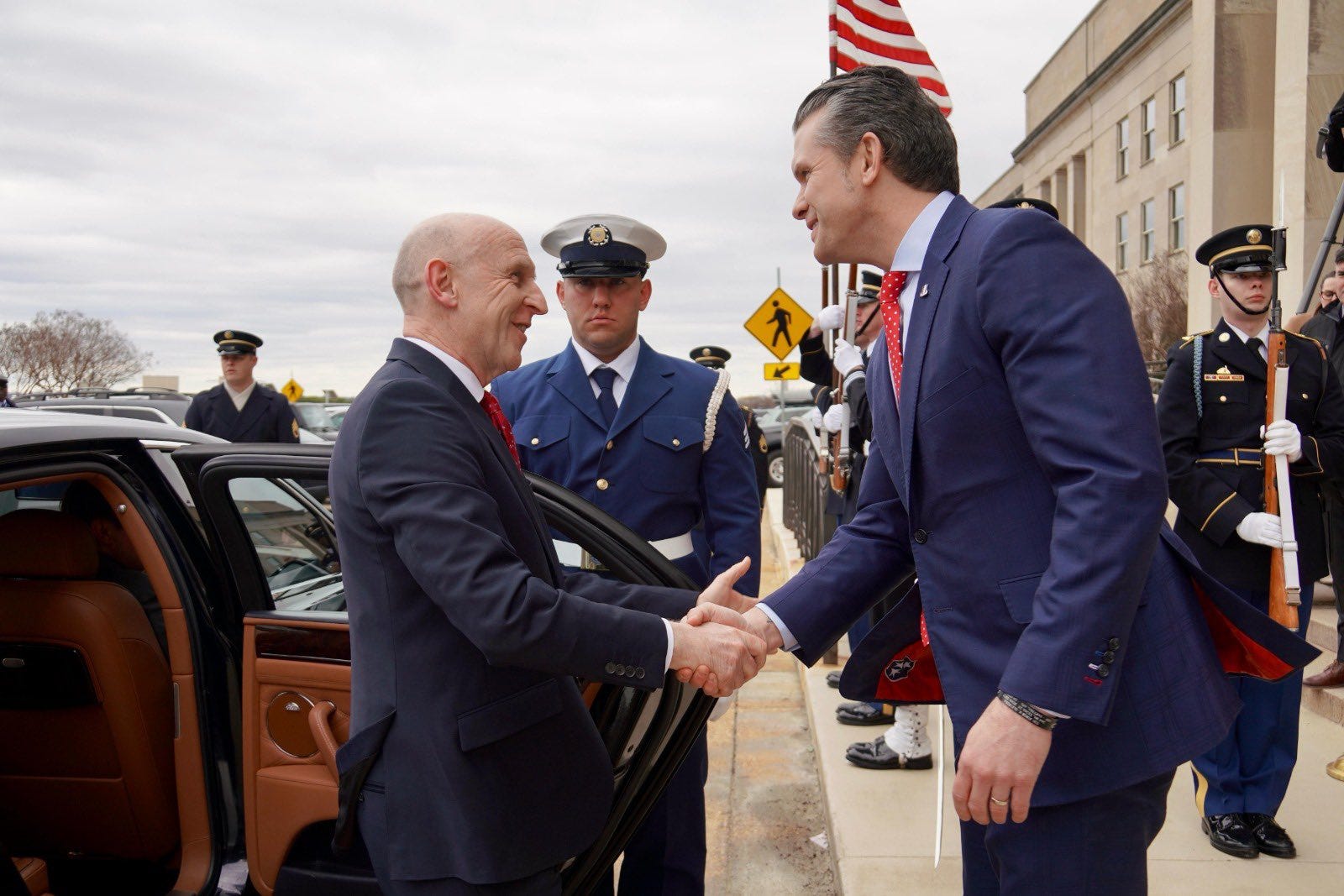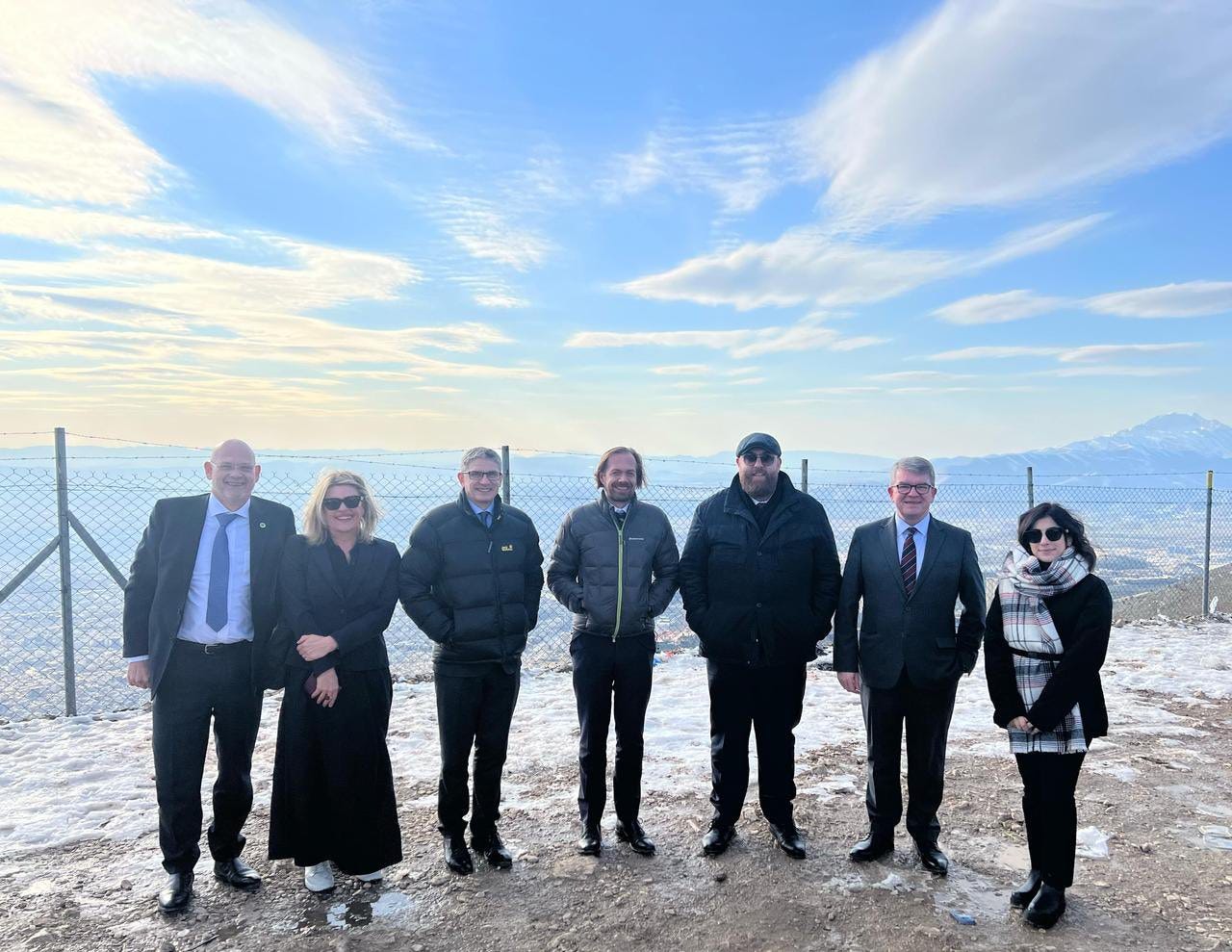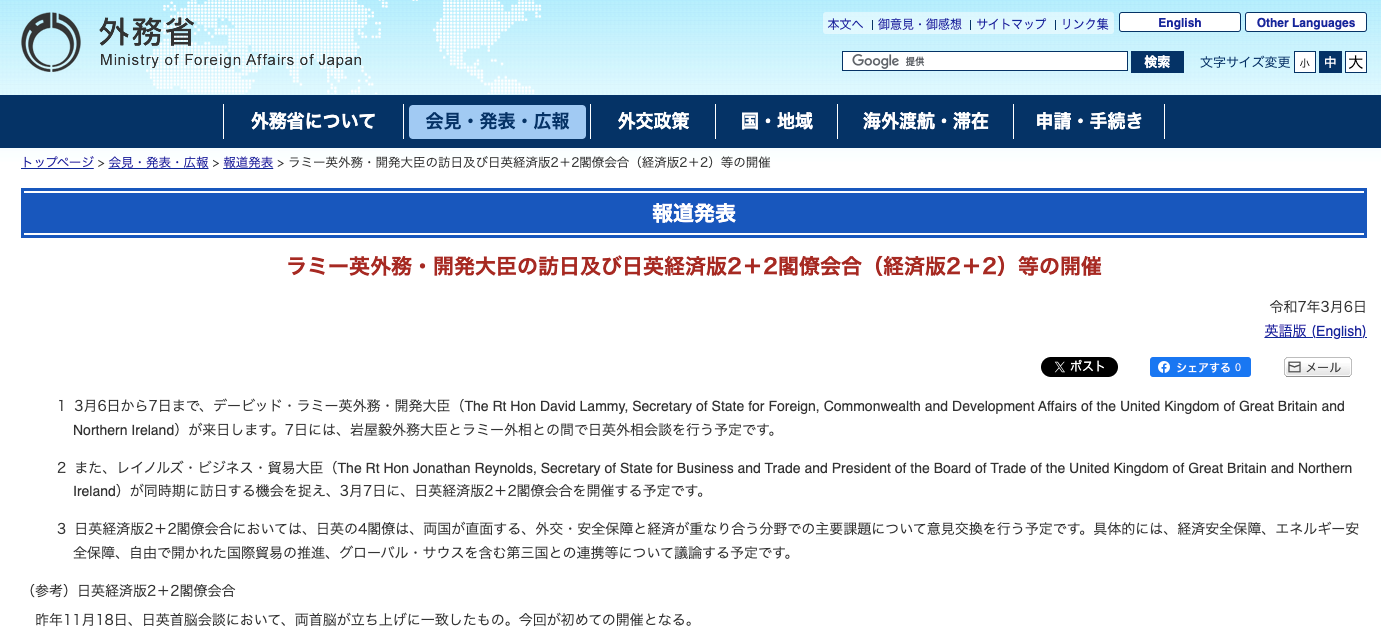Telegram 013
Migration, Japan, UAE: Sam Hogg's British Diplomacy Tracker
As a reminder: all opinions expressed in these Telegrams are my own personal opinions, not my employers. This is a project I run for fun in my free time.
Hello,
As America’s involvement in World War II appeared ever more certain, Congress allocated $10.5 billion to strengthen U.S. military bases and equipment. Sitting in Washington D.C., a hitherto unknown Senator from Missouri became immensely displeased with the defence establishment’s close relationship with companies and procurement. This World War I veteran, a keen defender of America’s liberties and values, decided to embark on a 10,000-mile drive to see for himself how the newly allocated money was being spent.
Returning to his trip to Washington in 1941, the Senator immediately proposed the creation of a Committee to scrutinise the deals being made. Congress agreed, and the ‘Senate Special Committee to Investigate the National Defense Program’ was created, with a remit to investigate “the procurement and construction of supplies, materials, munitions, vehicles, aircraft, vessels, plants, camps, and other articles and facilities in connection with the national defense.”
Given a modest $15,000 initially, by the autumn of that year, the Committee had identified projects that could be slashed to the tune of $250 million. Its budget was raised to $50,000. By the end of its short seven-year existence, the Committee was credited with returning between $10 and 15 billion to the Government coffers, saving thousands of lives by uncovering defective equipment and materials that were to be used by troops, and shortening WWII by streamlining federal contracting practices.
As Britain prepares to dramatically increase its defence expenditure while reforming its procurement, ambitious British politicians could learn a thing or two from how Harry Truman ran his Committee. Against political headwinds, he pushed for transparency and honesty. Ignoring the risk to his own career, he travelled to the source, and called it as he saw it. As noted by the Levin Centre, when stacked on top of each other, the evidence records collected by the Truman Committee tower 775 feet. With spending set to increase, diligent MPs should scrutinise where the money is going and how the Ministry of Defence is utilising it, without fear or favour: doing so is in the best interests of Britain.
As President Truman would say: “There is no substitute for facts.”
— Sam Hogg (come and say hello)
Keir Starmer, Britain’s Prime Minister, convened European and other Western leaders in London for a gathering aimed at shoring up support for Ukraine in light of a bruising visit to the White House. The defence situation changed rapidly over the week. Mr Starmer delivered a speech at the first annual UK-Ireland Summit. His words had a strong focus on energy security. He also hosted India’s External Affairs Minister Dr S Jaishankar, who also met with other prominent British politicians before delivering comments at Chatham House.
John Healey, the Defence Secretary, visited the United States and met his counterpart Pete Hegseth.
David Lammy and Jonathan Reynolds, the Foreign and Business and Trade Secretaries respectively, visited Japan. Mr Lammy was set to travel on to the Philippines. Mr Lammy also joined calls with his European counterparts to discuss the evolving Ukrainian situation, and hosted his Nigerian and Indian counterparts in London. Mr Reynolds spoke to his US counterpart, Commerce Secretary Howard Lutnick, about possible tariffs on Britain’s steel.
Baroness Jenny Chapman, the newly promoted International Development Minister, visited Uruguay. She attended the inauguration of Yamandú Orsi.
Hamish Falconer, Minister for the Middle East and North Africa, visited Turkey.
Gareth Thomas, Minister for Services, Small Businesses and Exports, visited Morocco. He met Minister for Investment Karim Zidane.
Britain announced further collaboration on halting illegal immigration with both Iraq and Vietnam.
Mélanie Joly, the Canadian Foreign Minister, revealed to the BBC that she told Mr Lammy, National Security Adviser Jonathan Powell and Downing Street aide Morgan McSweeney that President Donald Trump is serious about annexing Canada. Readers will recall Ms Joly was recently in London.
The Foreign Affairs Committee visited Saudi Arabia.
1. Defence and Ukraine

This will not be a long section on Ukraine, European defence and diplomacy, or the White House. The situation develops too rapidly to add meaningful value beyond what any analyst or policymaker can read in the papers, and many who claim to know what the ‘inside track’ is seem to be disproven on an hour-by-hour basis. A key overview is provided below.
KEY POINTS:
Prime Minister Keir Starmer spent the week trying to mediate between the United States, Europe, and Ukraine. Mr Starmer had to content with insults and threats flying back and forth, and a request from the U.S. to stop sharing intelligence with Ukraine.
The Government’s strategic communications have gone heavy on defence-related issues. Mr Starmer hosted defence companies and their apprentices in Downing Street for a choreographed event, discussing how the new defence posture will benefit job creation.
Comments made by U.S. Vice President J.D. Vance caused deep upset in Westminster. John Healey, the Defence Secretary, visited Washington DC to meet his US counterpart Pete Hegseth.
Noted
On Tuesday, New Zealand High Commissioner Phil Goff made comparisons between efforts to end the war between Russia and Ukraine to the Munich Agreement of 1938 during the Q&A segment of a Chatham House talk.
He said "I was re-reading Churchill's speech to the House of Commons in 1938 after the Munich Agreement, and he turned to Chamberlain, he said, ‘You had the choice between war and dishonour. You chose dishonour, yet you will have war.’ President Trump has restored the bust of Churchill to the Oval Office. But do you think he really understands history?”
Within 48 hours, the New Zealand Government fired him.
2. Migration

KEY POINTS:
While foreign policy bandwidth again focused primarily on Ukraine, Britain made clinical moves to stamp down on illegal or irregular migration this week.
Distribution of anti-migration propaganda began in Iraq following a senior visit, and a deal with Vietnam was signed targetting people smugglers.
India’s top diplomat also discuss the issue in a conversation with Home Secretary Yvette Cooper in London.
Like every government before them for the last three decades, Labour’s election-winning manifesto promised to clamp down on illegal immigration and reduce net migration. Its efforts to reduce the former have seen collaboration across Downing Street, the Home Office, and the Foreign Office: HQ, downstream, and upstream. That in turn has manifested itself in what Britain asks for from its partners and adversaries around the world.
Last week, Britain’s Border Security Commander, Martin Hewitt, visited Iraq and the Kurdistan Region of Iraq (KRI) to progress migration-focused agreements reached between the Federal Government of Iraq and the UK Government in November [analysis here]. A key action from Mr Hewitt’s trip was the rollout of a new video campaign to try and dissuade migrants making the journey, following in the footsteps of similar campaigns used in Vietnam and Albania. From 2018 to 2024, over 150,000 people arrived in the UK illegally, and the Government is working on new legislation to try and increase its ability to act.
Quoted
“No one should be in any doubt that putting your life in the hands of a smuggler is not worth the risk. Too many people have died in the English Channel at the hands of these criminals, and we will stop at nothing to bring them to justice.”
Dame Angela Eagle, Minister for Border Security and Asylum
Across the other side of the continent, a joint communique between Viet Nam and Britain further hammered home the action taken to disrupt illegal immigration. Signed at the third annual UK-Vietnam Migration Dialogue in Hanoi, it included a series of committments to both stop illegal migration and speed up the process of returning those who arrived without the right permissions.
Noted
The Border Security, Asylum and Immigration Bill was introduced in the House of Commons earlier this year. The Government hopes the Bill, once passed into law, will give it new tools needed to tackle illegal immigration.
This includes stronger powers to seize and search mobile phones to investigate organised immigration crime and new offences against gangs conspiring to plan crossings, selling or handling small boat parts for use in the Channel, or supplying forged identity documents for migrants attempting to come here illegally.
In a similar manner to how almost any geopolitical announcement to do with financials finds itself shoehorned into a diplomatic press release under the Government’s ‘Plan for Growth’ mantra, countering illegal immigration sits under its ‘Plan for Change.’ To this end, India’s influential top diplomat Dr S Jaishankar was in town. Meetings with the Prime Minister and Foreign Secretary saw discussions on issues from AI to Ukraine, but a one-on-one with Home Secretary Yvette Cooper specifically raised “the flow of talent, people to people exchanges, and joint efforts in tackling trafficking and extremism.”
3. Japan engagement
KEY POINTS
The Foreign and Trade Secretaries David Lammy and Jonathan Reynolds flew to Japan for the Japan-UK Economic 2+2 Ministers’ Meeting with counterparts Takeshi Iwaya and Yoji Muto.
Britain is the only country other than America to hold this form of meeting with Japan.
The main meeting saw discussions on "key issues facing both countries in areas where diplomacy, security and the economy overlap…specifically…. economic security, energy security, promotion of free and open international trade and third-country cooperation, including the Global South."
How should the world's fourth and sixth largest economies interpret the actions of its first and second? That, among other issues, is what Foreign and Trade Secretaries David Lammy and Jonathan Reynolds are discussing with their Japanese counterparts as this note goes to press. The ‘2+2’ format marks the first time a country other than America - which helped recreate a post WWII Japan - has been given the honour, and should be seen as further evidence of tightening relations begun during the first Trump era.
Noted
This is the first ‘2+2’ Britain has held with any nation.
In a letter to Japan’s leading paper, Mr Lammy set out why this was the opportune moment for closer ties. “This is a chance for the U.K. and Japan to work even closer together on shared challenges at the interface of geopolitics and geoeconomics”, he argued. Defence relations are going from strength to strength, with the Carrier Strike Group arriving in Japan later this year, and the landmark Global Combat Air Programme with Italy progressing nicely. Both nations are free trading, open market economies, sharing a CPTPP partnership and economic strategies around clean energy. In a shared press conference, Mr Lammy added that Japan could help the Ukraine crisis by ramping up pressure on Russia’s economy.
Quoted
“We are both open economies, whose businesses trade and invest all over the globe. Over a thousand Japanese companies do business in the U.K., supporting 160,000 jobs. The U.K. is the second-largest source of investments in Japan. We are the two biggest economies for CPTPP -- the trans-Pacific trading agreement which came into force in the U.K. last December.”
Foreign Secretary David Lammy
Of particular interest was the emphasis Mr Lammy’s letter, and stressed in the Government’s press release, was artificial intelligence and quantum technologies. The latter stated “In Tokyo the Foreign Secretary and Business and Trade Secretary will host an AI business reception to promote the UK’s AI Opportunities Action Plan and discuss with Japanese AI leaders the scope for new growth opportunities between British and Japanese AI.” Recent collaboration in this space has included the Japan-UK Quantum Technologies for Innovation, where the Japan Science and Technology Agency (JST) and the UK's Engineering and Physical Sciences Research Council (EPSRC) launched a joint call for proposals to support collaborative research projects in quantum technologies, and Britain’s ORCA Computing and Japan's Jij Inc. announcing a strategic partnership to advance quantum computing technology.
Naturally, these were echoed in the UK-Japan strategic economic policy and trade dialogue – joint statement which followed on Friday. It also featured joint concerns about “non-market policies and practices including harmful industrial subsidies, market-distortive practices of state-owned enterprises (SOEs) and forced technology transfer, as well as harmful non-market excess capacity and other market distortions resulting from them.” No prizes for what nation that’s referring to.
UN SECURITY COUNCIL
In a statement at the UN Security Council, Britain said the unanimous adoption of the resolution sent a clear message of unity in supporting Somalia's fight against Al-Shabaab. The resolution retained robust sanctions aimed at disrupting Al-Shabaab's finances, enhancing international collaboration, and aiding Somalia in strengthening its own capabilities. It also highlighted concerns about weapon flows from Yemen to Somalia and the destabilising activities of the Houthis.
In a statement at the UN Security Council, Britain said it fully supported the UN's decision to pause humanitarian operations in Saada following the detention of aid workers and the death of a World Food Programme staff member in Houthi captivity. The UK condemned these actions and called for the unconditional release of all detainees. Additionally, the UK expressed concern over violations of the arms embargo, citing the interdiction of advanced weapon components reportedly destined for Hodeida port, and urged all member states to comply with the embargo to achieve lasting peace in Yemen.
DEFENCE
Britain announced a £65 million contract with CGI UK to develop 'Borealis', a UK-made command, control, and data processing system. This system will enhance the UK's ability to monitor and protect military satellites by compiling and processing data from multiple sources more efficiently. The five-year contract will support approximately 100 skilled jobs in Leatherhead, Reading, and Bristol, thereby boosting the UK's space capabilities.
The UK's SKYNET 6A military communications satellite completed its initial testing phase at the National Satellite Test Facility in Harwell, Oxfordshire. Scheduled for launch in 2026, SKYNET 6A will enhance secure communications for UK and allied forces, supporting various military operations across all domains. This project sustains 550 highly skilled jobs across the UK, including in Stevenage, Corsham, and Portsmouth.
Maria Eagle, Minister of State for Defence Procurement and Industry, emphasised the need for Europe to enhance its defence industrial capabilities, highlighted the UK's commitment to increasing defence spending to 2.5% by 2027 and 3% in the next parliament, and underscored the pivotal role of UK-France cooperation in strengthening European security
Britain signed a £30 million contract with leading US firm Anduril to supply advanced attack drones to Ukraine, aiming to bolster Ukraine's defences against Russian aggression in the Black Sea. The Altius 600m and 700m drones, known as loitering munitions, are designed to monitor areas before striking targets.

FOREIGN AFFAIRS
Britain, alongside France and Germany, expressed deep concern over Israel's decision to halt all goods and supplies into Gaza, emphasizing that such actions could violate international humanitarian law. They called on Israel to fulfill its international obligations by ensuring the rapid, safe, and unhindered provision of humanitarian assistance to Gaza's population, including essential items like medical equipment and water and sanitation supplies. They also stressed that humanitarian aid should never be contingent on a ceasefire or used as a political tool.
Britain, along with Canada, France, Germany, the Netherlands, Norway, the United States, and the European Union, condemned the hostilities in Upper Nile State, expressed concern over the detention of senior officials, and called for an immediate cessation of violence, urging Juba-based leaders to commit to peaceful dialogue and prioritise the interests of the South Sudanese people.
William Ruto, Kenya’s President, met Britain’s High Commissioner and stated "The United Kingdom remains one of Kenya’s key strategic partners."
Catherine West, the Indo-Pacific Minister, congratulated the Indian Ocean Rim Association (IORA) on its 28th anniversary, highlighting its role in ensuring a secure, resilient, and prosperous Indian Ocean. She reaffirmed the UK's commitment to cooperating with and supporting the IORA Secretariat as a dialogue partner.
SANCTIONS
Britain lifted asset freezes on 24 Syrian entities, including the Central Bank of Syria, Syrian Arab Airlines, and energy companies, to support Syria's economic reconstruction and political transition. Sanctions on Assad regime members and those involved in the captagon trade remained in place
SOFT POWER
Britain recently completed communications training for Solomon Islands political staff.
TRADE & ECONOMY
British businesses are bullish on Taiwan. Ruth Bradley-Jones, Representative at the British Office Taipei, and Martin Kent, His Majesty’s Trade Commissioner for Asia Pacific currently visiting Taiwan, announced the latest 2024-25 British Business Survey results at an event hosted by the British Chamber of Commerce in Taipei.
AI AND EMERGING TECH
Jenny Chapman, the Minister for International Development, discussed how Uruguay is using AI to tackle illegal fishing.
ENERGY
Rachel Kyte, the UK’s Special Representative for Climate, emphasised the UK’s ongoing support for South Africa’s energy transition through the Just Energy Transition Partnership (JETP).
AID
The UK's Just Transitions for Water Security Programme (JTWS) is a four-year, £39 million initiative aimed at enhancing global collaboration on water resource management and climate resilience. This week, the JTWS team explored Morocco as a potential partner, engaging with key ministries, the private sector, and academia to accelerate progress towards Sustainable Development Goals (SDGs).
DIPLOMATS
Jane Marriott, High Commissioner to Pakistan, met Prime Minister Shehbaz Sharif.
Giles Portman, Ambassador to Romania, discussed foreign, security, and defence cooperation with Foreign Minister Hurezeanu, focusing on support for Europe, NATO, and Ukraine. He also spoke with Education & Research Minister David about a broad programme of engagement, including collaboration through the British Council.
Adnan Qadir Khan, the Foreign Office’s Chief Economist, was in the Caribbean.
UAE
KEY POINTS
Security Minister Dan Jarvis and Economic Secretary to the Treasury Emma Reynolds visited the United Arab Emirates last week
Mr Jarvis sought to strengthen policing ties, while Ms Reynolds focused on dual listing issues
The wider bilateral has gone through a recent rough patch, primarily thanks to perceived slights against the UAE by British policymakers.
One area worth scrutinising going forward will be the UK’s ability to compete or collaborate with UAE’s AI vision
Labour’s constrained fiscal rulemaking has meant looking beyond Europe for new sources of investment and trade. One such area, as noted in several previous Telegrams, is the Gulf. Senior ministers visit Saudi Arabia at a pace of at least once every eight weeks, and Qatar has witnessed its fair share of officials too, not least because of its ongoing role as a convening power for ceasefire talks in Gaza.

Receiving less attention is the United Arab Emirates. Like Saudi and Qatar, the UAE can trace close diplomatic and economic relations with Britain to its founding just over half a century ago. Like its two peers, the small nation has invested substantially in many of Britain’s key sectors.
Noted
The Foreign Affairs Committee, a cross-party group of British politicians, recently visited Isreal and Saudi Arabia. They met KSA’s Human Rights Commission and Dr Hisham bin Abdulrahman Al-Sheikh, the Vice President of the Commission, to discuss matters of human rights in Saudi Arabia.
Two ongoing sticking points upset the Emirates. First, politicians made a scene around a UAE-linked bid to buy the right-wing newspaper The Telegraph, which ultimately saw the deal blocked. Presented as a win for media freedom, it was viewed in the eyes of some observers as an unnecessary and unjustified politicisation of a process that was meant to be acutely apolitical. Second, the UK’s criticisms of the ongoing atrocities in Sudan shone on awkward light on the Emirates, which is alleged to be aiding one of the groups committing appalling abuses, the Rapid Support Forces.
Regardless, under Labour, efforts are being made to shore up economic and security links once more. On her first foreign trip in her new role, Emma Reynolds, the Economic Secretary to the Treasury, recently told the UAE’s national paper that she was keen to see more companies dual listing between both nations’ stock exchanges, and praised already existing FDI. This echoes efforts underway by the Abu Dhabi Securities Exchange (ADX), which has been actively encouraging dual listings.
Also speaking to The National during his time in the Emirates was Dan Jarviss, the Security Minister. Mr Jarvis noted collaboration between UK and UAE law enforcement and banks would be critical to shutting off the supply of illicit finances. Given the amount of capital flowing between both regions, Britain and the UAE have worked closely on tracking and monitoring financial issues in the past.
Quoted
““The UK hugely values the relationship we have with the UAE. As a relatively new government, we've got a lot to learn from this country. We already have a close working relationship with senior ministers in the government and I've had a very constructive meeting with the head of Dubai Police.”
Dan Jarviss, Security Minister
Going forward on Britain-UAE bilateral ties, it seems Foreign Secretary David Lammy’s focus on Sudan (a conference is in the works) will increase the likelihood of issues around Emirati support for the RSF being an issue. This has already raised issues at the United Nations under the previous government.
Noted
MGX, an Abu Dhabi-backed AI investment vehicle, was created in March 2024 with a target of $100 billion in assets; MGX, Microsoft, BlackRock, and Global Infrastructure Partners launched a $100 billion AI data center fund in September 2024.
The Stargate Project, announced almost immediately by President Trump in January 2025, involves a $500 billion investment in AI infrastructure in the US, with UAE-based MGX as one of the four main equity funders.
The second area worth noting is that the UAE, like other forward thinking governments, is strategising and investing heavily around artificial intelligence. In the first instance, it’s aiming for 20% of its non-oil GDP to come from AI by 2031. Notably, according to recent CSIS analysis, the UAE accepts US export controls but is frustrated by its classification alongside countries like Saudi Arabia and Pakistan; Britain sits in the highest classification tier. As countries seek to become AI sovereign, this could be an area of friction, or perhaps collaboration.









Was this written in Newspeak? Thanks for the giggles, Britain is done for.